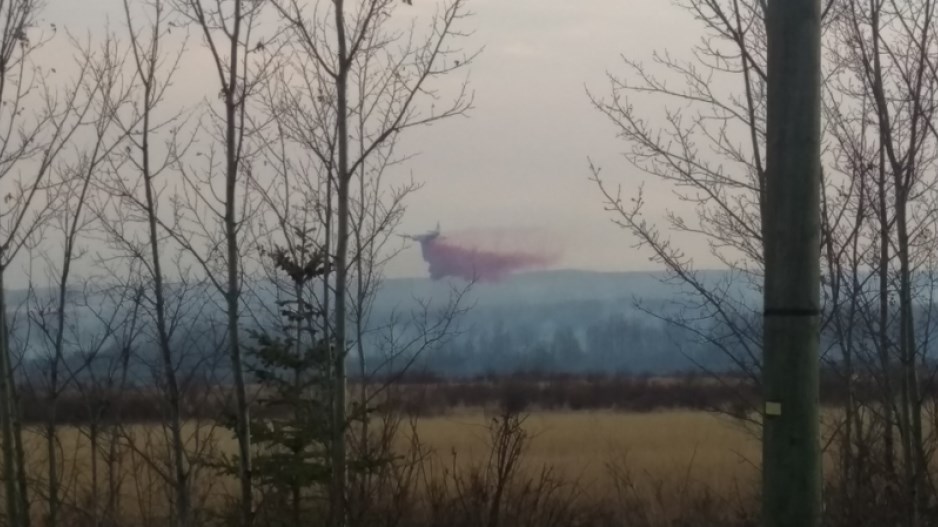As wildfires tore through the land next to Kelvin and Heather Hiebert’s property in Rose Prairie last month, the area quickly went from eyesore to hazard.
The property hasn't been farmed in over 30 years. It's covered in waist-high grass, with an unkempt fence line that backs onto a stand of trees. They've seen the owner, who's from Germany, just a handful of times.
"We've been saying for years that it's only going to take a lightning strike or a carelessly thrown match to cause a lot of damage in the neighbourhood, because of these areas that are not looked after," Heather Hiebert said.
The Hieberts, who grow grain and raise cattle in Rose Prairie, are one of an untold number of farmers in the Peace Region living adjacent to absentee-owned land.
For Karen Goodings, who represents the rural area at the Peace River Regional District, this year's early fire season is raising new questions about foreign ownership of B.C.'s farms.
"Either farm it or rent it out, or somehow manage that tall, dry grass," Goodings said. "That created a real issue for some of the neighbours of that land because it was a definite fire source."
The impact of absentee-owned land on wildfires, which burned an unprecedented 80,000 hectares in Northeast B.C. by mid-May, is a new wrinkle in the ongoing debate over foreign ownership in B.C.
B.C. has no restrictions on out-of-country ownership of farmland, which has long led to speculation that foreign investment is driving up prices. The province does not track the country of origin of a land purchaser, so much of the information about the phenomena is anecdotal.
Kevin Boon, general manager of the B.C. Cattlemen's Association, said that to his knowledge, B.C. is the only province in Canada "that doesn't have some sort of foreign ownership regulations on farmland."
"It is fairly extensive. We have a fair number of ranches that are foreign-owned," Boon said. "It is a concern for us, as to why they're purchasing land, and what is our ability to integrate that into our own province's economy as well as its food supply."
The issue most recently came to light last May, when it was revealed the British multinational Reckitt Benckiser Inc. had purchased swathes of B.C. farmland for reforestation for carbon offsets.
Boon said that while he wasn't familiar with the context in the Peace, he was aware of other out-of-country buyers picking up B.C. farmland as investment properties. "They know the value of land's going to go up, and they can purchase some land up there," he said.
Goodings, a farmer in Cecil Lake, said foreign ownership is a factor in the agricultural land market in Northeast B.C.
She hopes to push the province's Agricultural Land Commission to set new conditions on absentee property owners, requiring upkeep of properties that are increasingly becoming fire hazards.
"We're fortunate to have relatively cheaply-priced farmland in Canada," she said. However, the buyers "may not be Canadian citizens or may not do anything with the land."
Foreign ownership in Vancouver
In that way, there are parallels with the foreign ownership debate in Vancouver—where housing prices are skyrocketing amid a flood of largely-Chinese investment. According to the Real Estate Board of Greater Vancouver, the average price of a detached home in Metro Vancouver jumped 36.9% year-over-year last month.
A Farm Credit Canada report released in April showed that farmland values in B.C. continue to rise, however more slowly than a decade ago. The average value of B.C. farmland grew 6.5% last year, well below the national average of 10.1%. B.C.'s agricultural land market was hottest in 2006, when the province saw a 19.3% year-over-year gain in the price of farmland.
The report notes that in the Peace, most parcels sold privately to local producers. And while B.C. does not restrict foreign ownership, the Agricultural Land Commission places stringent rules on non-agricultural use of farmland.
Vancouver's foreign ownership debate is already having an impact on rural property.
New rules brought in to gauge the impact of out-of-country investment in the Lower Mainland promise to shed some light on foreign ownership of farmland. Starting June 10, B.C.'s finance ministry will begin collecting citizenship data on property transfer tax forms. According to a ministry spokesperson, those new rules will apply to ranches and agricultural land, meaning Vancouver's real estate market will give some insight into foreign ownership of farmland.
At the end of the day, though, Heather Hiebert just wants her neighbour to cut the grass.
During the worst of the blaze, her husband carved a clearing into the absentee-owned land with his tractor to keep the fire from spreading. A water bomber soon made short work of the fire in the adjacent field.
She supported Goodings' push for more regulations on absentee-owned property, but added there are plenty of locals who also fail to keep up their land.
"It is becoming more and more of a problem," she said. "The land is becoming a fire hazard because the grass is waist deep and there's nothing you can really do about it."
Check out BIV’s podcast for the week of June 6, 2016:




